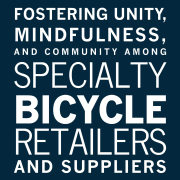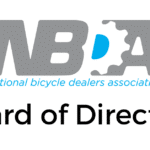Retailer Insights From the 2022 BLC
PeopleForBikes hosted its Bicycle Leadership Conference (BLC) March 21-23, 2022 in Dana Point, California. The NBDA was proud to have our Board Chair, Peter Henry, at the event. Peter Henry, from Landry’s Bicycles, has been in the bicycle industry since 1975. Leading the NBDA Supplier Relations Committee, Peter is an advocate for retailers and is working to develop best practices for both vendors and retailers. He has also been a member of the NBDA P2 Program since 2012 and has worked on his business and helped others to thrive in all areas of profitability. He shares with us these key takeaways from the event for retailers.
The 2-day event welcomed some of the biggest names in the industry. The conversations during networking breaks echoed those of one of the opening presentations; the industry is changing and growing at a rapid pace as we see consolidation and outside investment. A high-level presentation in which one of the presenters was Joe Graney, CEO of Santa Cruz Bicycles and COO of Pon Bike North America, outlined the vision for the future at all levels of the bike industry. It is remarkable that some of the investors and consolidation we are seeing are by organizations that are focused on the growth and diversity in the individual brand and shop. Remarks from a high level on the value in what retailers are doing on the individual level was significant. Also speaking was Nathan Pund of investment banking firm Houlihan Lokey. He reports that there is abundant venture capital money looking to be invested in bicycling. While bike shops may not deal with investment bankers, many of the same things apply to other investors or lenders as well. A business needs to have a unique vision for how it will succeed with a specific segment of a potential market. Each of us as a retailer needs to know what customers we expect to reach, sand how we will serve them in our own distinctive way. A key take way- do what you do. Plan for how your “brand” operates to be sustainable. Think of the ways that you can make your business valuable in the future.
Eliot Jackson, Chairman of Grow Cycling was joined by Rahsaan Bahati, Founder of Bahati Foundation and others for a riveting conversation on welcoming diverse participation. Topics included making trails more accessible to all cyclists, with Quinn Brett sharing her personal journey. Retailers should be thinking about the way our store is accessible to everyone who comes across your store in all ways, from hiring to welcoming, to wheelchair and special needs. Anything you can do helps.
Another presentation that stood out was about our new customers. The presentation dove into who these new riders are and how we can continue to communicate with them to keep them riding. A theme from the presentation was “Sell Where They Ride”. As a retailer, you are the local source; you are organizing the rides near the trailhead. The idea here is your local community can be the hub of all things cycling. Create an experience that involves trails, safe places to ride, and gives your local community a reason to get on two wheels. While there was clear evidence that most success in selling bicycles near term will be through bike shops, there was also clearly a lot of thought being given to “how can suppliers succeed without depending on bike shops”. As specialty bicycle retailers, we must seize every opportunity to remind our suppliers of the value we provide them in serving consumers. Just as we have value propositions for our customers, we need value propositions for our suppliers. As with customers, some of that proposition should be the things that are true of bike shops in general, but much of it should be things unique to each of our own businesses.
Finally, our concern over global supply is still spiked. The conversation around global supply was introduced by NBDA friend, Bob Margevicius, Executive Vice President of Specialized Bicycle Products, and included a presentation from Jean-Marc Sorhondo, Head of North America Ocean Operations, Flexport. Retailers should note that Flexport is a platform focused on tracking and delivery for the global supply chain. We are hopeful their involvement will allow the industry to have more accurate data on the delivery and lead times.
It is striking that Flexport felt that a key for how they compete in their supply chain business is by providing accurate information to their customers (typically the importer of the product). We should be asking our suppliers (who are customers of businesses like Flexport to get the product from the factory to their US warehouses) to likewise provide us with transparent and accurate information.
Finally, there was a presentation from the Motorcycle Industry Council and Powersports Industry and Safety Associations, on how they have been impacted by developing regulations of new products. There is substantial risk that any powered product could become regulated as a motor vehicle rather than as a consumer product. Products that don’t fit within an established regulated category can become subject to regulation retroactively – something that you thought could be sold becomes worthless. The manufacturer is responsible for assuring that their products cannot be modified to escape the regulatory framework. While the CPSC focuses on manufacturers and importers, as retailers we need to cooperate by not attempting end-runs on regulations by modifying products, or those products might get regulated out of existence.
We are happy to share with you a brief synopsis of our key takeaways for retailers from the conference. PeopleForBikes organizes the Bicycle Leadership Conference to bring together the brightest leaders in the industry to collaborate, learn, and drive their collective vision of transforming America into the best bicycling nation in the world. It was great to see the industry unite once again for this important event. If you would like any additional information, you can reach out to us at heather@nbda.com.









